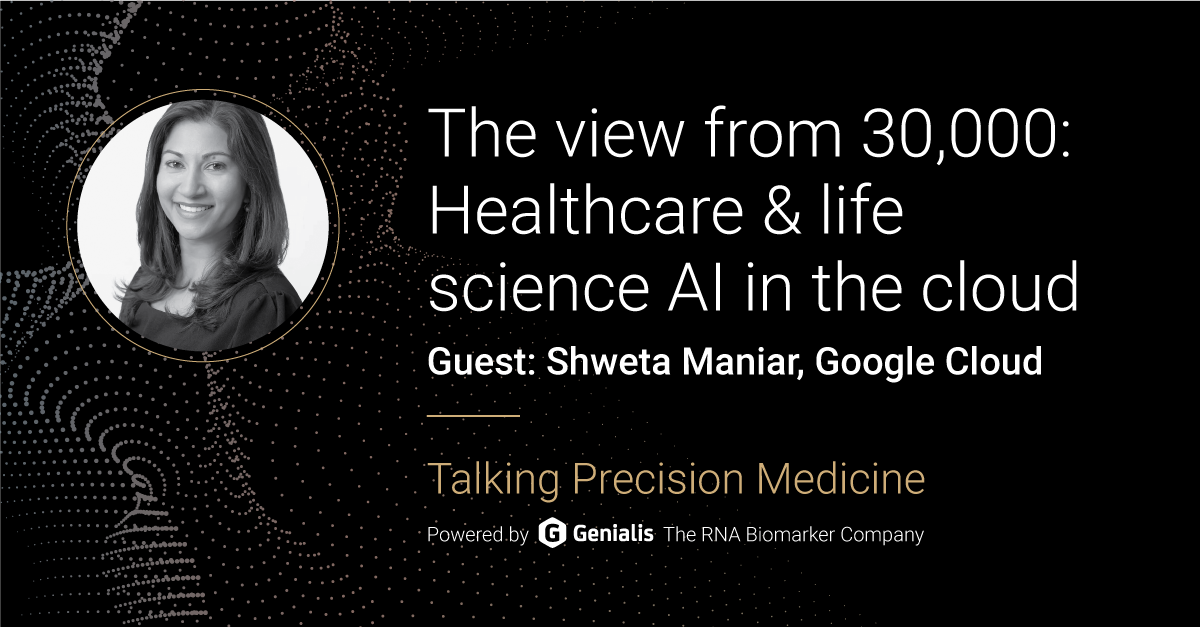Welcome to Talking Precision Medicine (TPM podcast) — the podcast in which we discuss the future of healthcare and health technology, and how advances in data and data science are fueling the next industrial revolution.
This episode features a conversation with Shweta Maniar, who leads the Healthcare and Life Science effort at Google cloud. In just a few short years, artificial intelligence has gone from the stuff of hype and fairy tale to powerful and ubiquitous tools for all aspects of R&D and healthcare delivery. Google has been central to this sea change. I discuss with Shweta how her organization helps make these advanced capabilities available to the masses, and so much more. Join us!
Come on in and have a listen.
Episode highlights:
Strategic leadership in healthcare tech
- Shweta Maniar, Global Director of Health Care and Life Sciences at Google Cloud, leads the strategic applications of Google’s innovations in the fields.
- She develops strategies to enhance operational efficiency and foster innovation in life science organizations.
“How do we take some of the fantastic technology that Google has created for itself, for the consumer space, and new AI innovation that’s coming out every day, and how do we appropriately apply it to support the health care and life science ecosystem?”
Personal journey
- Shweta Maniar’s background in healthcare research and technology transfer has equipped her with unique insights into integrating technology into healthcare solutions.
“Once I got to Google, I realized that ultimately, the journey has been around connecting dots between research and innovation technology for this healthcare and life science ecosystem. And so that’s exactly what I strive to do here at Google.”
- She serves on her city’s Parks and Recreation Commission and various boards, gaining insights into business decisions and community engagement.
“We live in such a fast paced world. Also, I work for a fast paced company. It’s sometimes very easy to get into a bubble of how we work and how fast we work. […] I’m learning how you interact with everyone and how you listen to each other’s ideas and take the time to slow down a little bit and realize that some of the biggest problems to me are not actually the biggest problems to others.”
Advancing healthcare with Google Cloud
- Google Cloud provides scalable infrastructure that enables health data storage and analysis by researchers and clinicians.
- Shweta Maniar compares Google Cloud and Google Health, explaining that Google Cloud offers foundational infrastructure for various industries, while Google Health specifically creates healthcare solutions using that infrastructure.
- Google Cloud’s technology serves as an enabler, improving efficiency and cost-effectiveness within the life sciences ecosystem.
“We all go to Google when we get any kind of diagnosis, any kind of symptom. And so how do we use the power that we have here in order to support patients with information? That can be developing AI models to identify cancerous lesions in medical images. It could be predicting treatment responses and it can even be assisting in the drug discovery processes. We are working with a variety of tools to help different patients manage their care and connect with support networks.”
Role of AI
- AI tools at Google Cloud, such as Vertex AI, enhance patient care by facilitating advanced research through complex data analysis.
- Shweta Maniar discusses AI’s role in disease trend prediction and drug development enhancement, particularly in areas like genomics and rare cancers.
“I was sitting on a panel in Washington DC around medical data and somebody in the audience had asked me a question around what if the output is biased and I remember having to stop everyone on the panel and say: “Just to put this very clearly, the output of AI cannot be biased unless the data that you put in there was biased to begin with.” It’s our responsibility to ensure that we are meeting the standards of the ethical and fair data principles – that’s what we all are always trying to adhere to.”
This has been Talking Precision Medicine. Please subscribe and share our podcast with your colleagues, leave a comment or review, and stay tuned for the next episode. Until then you can explore our TPM podcast archive and listen to interesting guests from our past conversations.




